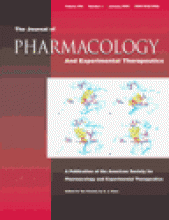Abstract
The aim of the present experiments was to study the effects of exogenously added anandamide on transient norepinephrine (NE)-induced contractions in mesenteric beds isolated from adult male Sprague-Dawley rats 6 h after the i.p. administration of 5 mg kg−1lipopolysaccharide (LPS). LPS treatment induced a 3-fold increase in total nitric-oxide synthase (NOS) activity without modifying either the systolic blood pressure or the vascular reactivity to NE of the isolated mesenteric bed. The endocannabinoid anandamide (0.01–10 μM) caused concentration-dependent reductions of the contractile responses to NE in the isolated mesenteric bed. This effect was significantly potentiated after LPS treatment compared with the controls. Anandamide-induced reductions of the contractile responses to NE in mesenteric beds isolated from LPS-treated rats were unmodified by endothelium removal but significantly diminished by either the anandamide amidase inhibitor phenylmethylsulfonyl fluoride (200 μM) or the vanilloid receptor antagonist capsazepine (1 μM). The vanilloid receptor agonist capsaicin (0.01–100 nM) also caused concentration-dependent relaxations that were potentiated in mesenteric beds from LPS-treated rats. Nevertheless, they were unmodified by 1 μM capsazepine. It is concluded that the potentiation of anandamide relaxations after LPS treatment, which are evident at early stages of endotoxic shock, could involve the participation of an anandamide metabolite and might be mediated, at least in part, through a vanilloid receptor.
Footnotes
-
This work was supported by grants PICT99 05-06917 from Agencia Nacional de Promoción Cientı́fica y Tecnológica República Argentina, Carrillo-Oñativia 2001 from Ministerio de Salud Pública de la República Argentina, and Fundación Antorchas Project 14022-112.
-
DOI: 10.1124/jpet.102.041095
- Abbreviations:
- LPS
- lipopolysaccharide
- NE
- norepinephrine
- NO
- nitric oxide
- NOS
- nitric-oxide synthase
- iNOS
- inducible nitric-oxide synthase
- PMSF
- phenylmethylsulfonyl fluoride
- Received July 9, 2002.
- Accepted September 25, 2002.
- The American Society for Pharmacology and Experimental Therapeutics
JPET articles become freely available 12 months after publication, and remain freely available for 5 years.Non-open access articles that fall outside this five year window are available only to institutional subscribers and current ASPET members, or through the article purchase feature at the bottom of the page.
|






